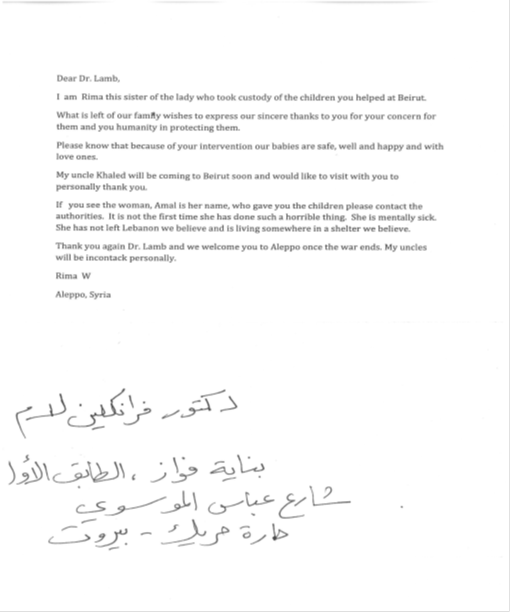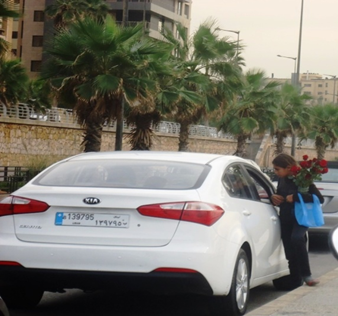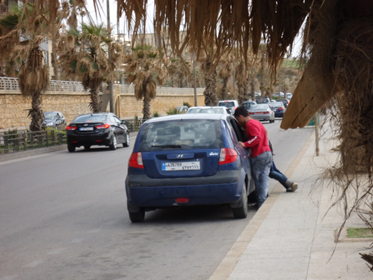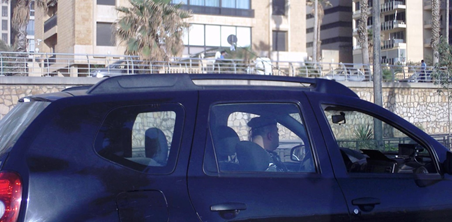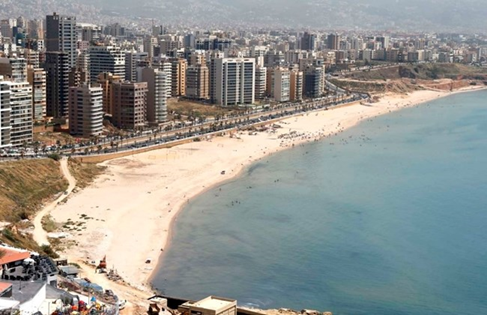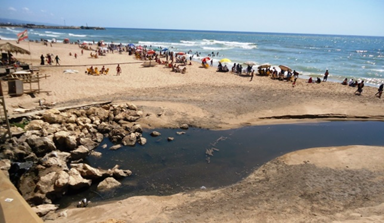What Four Syrian Refugee Children Have Achieved for Humanity in Lebanon
SYRIA IN CONTEXT, 13 Jun 2016
Franklin Lamb – TRANSCEND Media Service
10 Jun 2016 – Given the unanticipated intense interest in the subject of my article, which resulted in the receipt of more than 1000 emails, approximately 130 being requests or inquiries about adopting the children (as if I had any right or role with the children’s future, since engaging in the instantaneous transaction with the “vendor” that day related only to the reality of an in extremis situation that prompted a spur of the moment gesture to find safety for the little ones and report the case to authorities), an update about the four beauties is warranted. Unwittingly, the four beauties achieved much for humanity, as suddenly many in Lebanon engaged publicly with the subject of abused Syrian refugee children.
Shortly after the Ramlet el Baida event with the lady who sought money in exchange for the children, they were returned to the Aleppo area of Syria and are being cared for by distant relatives. A female relative of the children who learned about what had become of them appeared and it was clear from the children’s reaction of running to her and hugging her that they knew her and wanted to be with her. After verifying her connection with the children she took custody of them and a few days after their departure from Lebanon the note below appeared outside this observer’s south Beirut apartment door:
This observer met again with the children, this time in Syria, and also with their “uncle Khalid.” They appear very well and seem as secure for the moment as is anyone living these days in north Syria near Aleppo. They have food and a clean place to live and play with other children. When we met again we were all very happy and the older child remembered well the American “hide & seek” game we played in Beirut and insisted that we do it again. And his little sister blurted out from memory the “Ready or not, here I come!” call-out that starts the “hide & seek” search. They love that game and have taught it to their friends including the covering of the seekers eyes without peeking and counting loudly to ten.
But they are not in school yet. Their parents remain missing and reportedly were killed.
These children’s experience and public interest in them caused the Lebanese authorities to take more seriously reports of refugee children endangerment. At the urging of this observer and others, the Internal Security Forces now patrol Ramlet el Baida strip with undercover officers as shown in the photo below. Their efforts are preventing young girls from Syria and elsewhere selling themselves to the occupants of cars that pull up to purchase “roses” or offer money to young boys. The street kids have as of 6/1/2016 largely disappeared, at least for now. Hopefully to a more safe area with proper housing and assistance from NGO’s. More research is required to monitor their wellbeing. Hopefully the police will continue their humanitarian work and will respond seriously to reports from a concerned citizenry. The observer credits the 4 Syrian children with getting the attention of local authorities and helping other endangered children at Ramlet el Baida beach strip.
Credit due to the Internal Security Force (ISF) Lebanon’s police force that eventually, after many submitted reports from eyewitnesses, has last month agreed to send undercover cops to Ramlet el Baida strip. This observer’s friend, 12-year-old “Leila” from Aleppo shown above, and other Syrian children preyed upon by pedophiles using a pretense of “buying roses” are not currently working there. Vigilance by ISF undercover cops, one pictured below, will protect these hungry Syrian refugee children as long as they stay on the job until the kids can return to Syria.
Not only girls are being hunted along Ramlet el Baida beach. Many young Syrian males who may be their family’s only breadwinner are vulnerable as they desperately seek to earn cash to feed their loved ones.
ISF undercover cops in unmarked cars with cameras on the right side of the dashboard are alert as a result of the 4 Syrian children case and the public pressure it placed on multiple Lebanese government agencies. Beirut police are finally patrolling Ramlet el Baida beach and are protecting Syrian, Palestinian and other refugee children. All praises to them if they continue their vigilance until the refugee children can return home and to the only place they want to be – which is Syria. When that can happen, as we all know, is anyone’s guess.
Police Crack-down on the Prostitution Network
Another consequence of the attention given to the case of the 4 Syrian refugee children being “bought” at Ramlet el Baida beach was to provoke a long delayed police action shutting down a Syrian refugee girls (and women) sex slave operation in Maameltein, the red-light district of Jounieh about twenty miles north of Beirut on Mediterranean coast.
One official source informed a colleague that when five women were able to escape on Good Friday and catch a van to South Beirut, one of the women who somehow had heard about the four Syrian refugee children thought she might know them and made their way to south Beirut and eventually the women were put in contact with police authorities who investigated and raided the old house known as “Chez Maurice’’. Approximately 75 women and girls and an 8 month old child who was born in the brothel, because her mother hid her pregnancy until an abortion could not be done, were freed. According to the police, the women were imprisoned after arriving from their war-torn country, sold for less than $2,000, and forced to have sex more than 10 times a day. They were frequently beaten, tortured, given electric shocks and sometimes whipped if they didn’t receive enough tips. The windows and balconies were barred and windows painted black, depriving the women of any sunlight. The women left the house only to get abortions, of which they had about 200, according to police investigators. They also left to be treated for venereal diseases, contracted after being forced to have unprotected sex with customers, or to be treated for skin ailments, brought on by their lack of exposure to the sun. The women would sometimes work for up to 20 hours a day, from 10am until 6am the following morning.
The Internal Security Forces is reportedly conducting an internal investigation to determine how the network managed to escape detection for so long since locals report that it had been in operation for years and reportedly hosted government officials. Progressive Socialist Party leader Walid Jumblatt has repeatedly accused unnamed senior government officials of complicity in the operation but the promised government investigation appears to have stalled for some unexplained reason and like countless other corruption cases that involve public officials here, the matter remains “under investigation” and out of the news.
But the five dozen girls and woman are freed and are receiving needed care.
The observer credits the four Syrian refugee children and the public’s concern for their well-being with leading to the exposure and closing down the Jounieh sex slave operation.
Legal Ban on the Sale of Beirut’s only Public Beach
Another public benefit achieved by the 4 Syrian refugee children relates to Ramlet el Baida beach strip itself.
The above photo shows Ramlet el Baida, Beirut’s only free beach. It is an excellent mile long stretch and is frequented mainly by South Beirut’s poor Shia, Syrian, Kurdish, Iraqi, Yazed, and Palestinian refugees as well as low paid foreign workers.
Public access has been threatened with closure for several years because many of the high priced apartment dwellers opposite the beach want exclusive use. Even though many of the apartments are currently empty, two large developers are seeking to build luxury hotels and more apartment buildings at the seas edge while closing Ramlet el Baida to public use.
Dumping their sewage directly into the Mediterranean sea from their high-rise luxury apartments across the road, many of the rich occupants and probably all of the developers seek to close Ramlet el Baida beach and rid themselves of the “rabble” including no-account Americans like this observer who frequent the beach and whose presence one developer told the media “fouls the residents view of the sea and its glorious sunsets.”
But at least for now the beach will remain public per last month’s order of Beirut Municipality. A humanitarian decision partly inspired, it is believed, by the saga of the 4 bought” homeless Syrian refugee children and the public concern and discussion it resulted in.
On 5/3/2016 Beirut Governor Ziad Chebib approved a request to ban the sale of Ramlet al-Baida beach that was in danger of being fenced off from the public by private developers. His decision approves a request by the Public Works Ministry to prohibit the sale of the area and affirm that Ramlet el Baida beach cannot be bought or sold according to Order 144, issued in 1925 under the French mandate. Article 2 of Order 144 listed properties that should belong to the public, and included the “sea’s shore until the farthest area reached by waves during winter, as well as sand and rock shores.” However, Article 3 did grant those, who owned parts of coastal properties before the decision was issued, the right to use them for commercial purposes. If the state was to prevent such use of these properties to safeguard public interest, it ought to pay “fair compensations in advance,” the decision said. In 1966, another decree was issued to allow owners to build on their properties if their plans were approved by the Lebanese government and served touristic or industrial purposes.
The Beirut municipality’s important decision means that one mile long Ramlet el Baida beach will remain open to all without charge. Refugees and low income Lebanese who cannot afford the high prices demanded by Beirut’s other “private” beaches, some of which illegally deny entrance to foreign domestic workers and certain refugees.
The municipality of Beirut has been lobbied for some time by environmentalist and civil society NGOs to keep it public. The publicity over the 4 Syrian refugee children who were “sold” at Ramlet el Baida and other information provided to Beirut’s Municipal Council is believed to have tipped the scales.
As noted above, this observer credits the 4 Syrian refugee children and the concern over their well-being with influencing Beirut Governor Ziad Chebib’s humanitarian decision.
Feeding Starving Syrian Refugee Children in Beirut
Apart from their physical security, the greatest need of Syrian and other refugee children forced into Lebanon by the war next door is to eliminate malnutrition and lack of regular meals.
Yet again, the four Syrian children have made a difference because their plight was instrumental in establishing the NGO Meals for Syrian Refugee Children in Lebanon (MSRCL). This initiative can be examined and joined
http://mealsforsyrianrefugeechildrenlebanon.com.
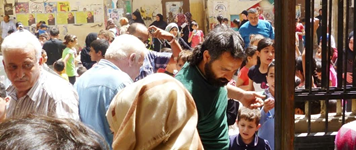
A late April MSRCL meal distribution event in South Beirut for hundreds of Syrian and Palestinian children.
Organizing even one meal for a starving Syrian or Palestinian refugee child–or for any malnourished youngster displaced by the war in Syria isn’t everything that matters right now in this region. For many of those working among them and to feed them it’s the only thing that matters.
Until the precious ones can return home.
To provide a meal to a Syrian refugee child in Lebanon: Please visit:
http://mealsforsyrianrefugeechildrenlebanon.com
___________________________________
All photos by fplamb
Franklin P. Lamb, LLB, LLM, PhD, Legal Adviser, The Sabra-Shatila Scholarship Program, Shatila Camp (SSSP-lb.com). Volunteer with the Palestine Civil Rights Campaign, Beirut and Washington, DC committed to help achieving the Right to Work and the Right to Home Ownership for every Palestinian Refugee in Lebanon. Lamb’s recent book, Syria’s Endangered Heritage: An international Responsibility to Protect and Preserve, is available on Amazon and other ebook outlets as well as at www.syrian-heritage.com . For Syria Heritage updates, please visit: www.syrian-heritage.com. To provide a meal to a Syrian refugee child in Lebanon please visit: http://mealsforsyrianrefugeechildrenlebanon.com. Lamb is reachable c/o fplamb@gmail.com.
This article originally appeared on Transcend Media Service (TMS) on 13 Jun 2016.
Anticopyright: Editorials and articles originated on TMS may be freely reprinted, disseminated, translated and used as background material, provided an acknowledgement and link to the source, TMS: What Four Syrian Refugee Children Have Achieved for Humanity in Lebanon, is included. Thank you.
If you enjoyed this article, please donate to TMS to join the growing list of TMS Supporters.

This work is licensed under a CC BY-NC 4.0 License.

